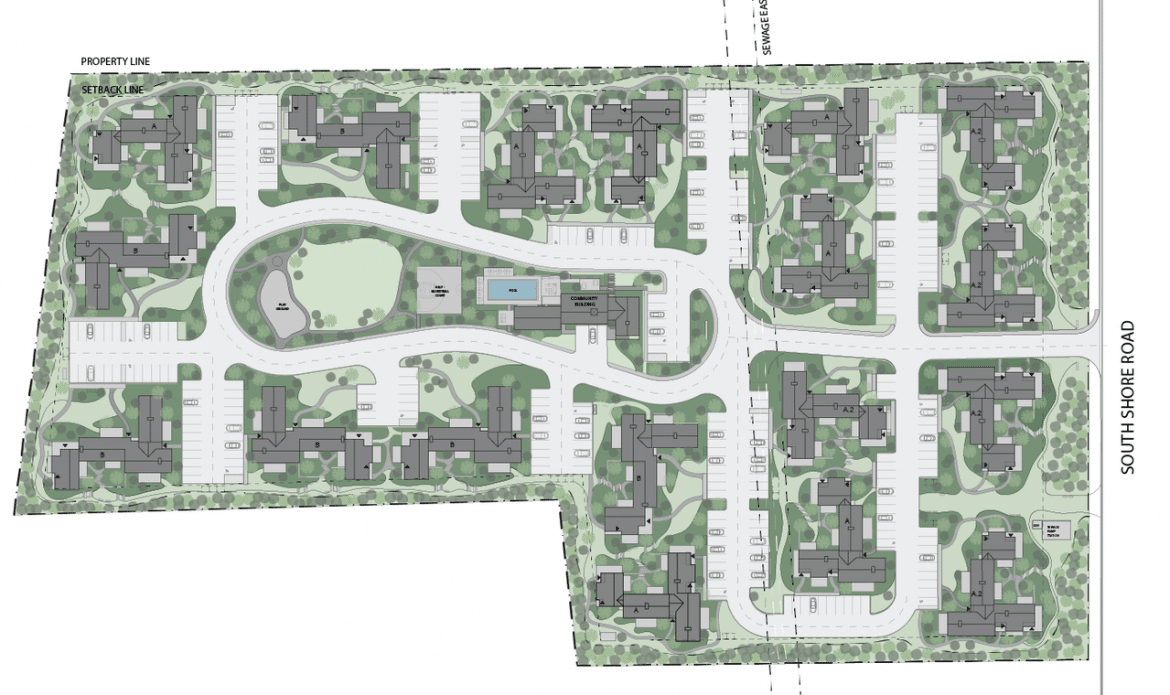In a significant setback for the controversial Surfside Crossing housing development, a Superior Court judge has ruled in favor of the Nantucket Land Council’s bid to intervene in the regulatory process, reversing an earlier decision by the state Housing Appeals Committee, which has final say over the project.
Surfside Crossing developers Jamie Feeley and Josh Posner are seeking approval from the state committee to build 156 condominium homes, contained within 18 three-story buildings (two stories above grade) on 13 acres of undeveloped pine forest off South Shore Road.
But Superior Court Judge Douglas Wilkins this week ruled that the Housing Appeals Committee (HAC) “committed an error of law” when it rejected the Land Council’s motion to intervene in the hearings. Wilkins vacated the HAC’s decision, and remanded the matter back for further consideration by the committee. The Land Council asserted that the ruling means the entire HAC proceedings “will have to start over from the beginning.”
“We are thrilled to have an opportunity to participate in the project review, and advocate, as we have for many years, for the protection of local interests and the unique and fragile Nantucket environment,” said Emily Molden, executive director of the Nantucket Land Council.
Not only will the ruling delay a final decision by the HAC on Surfside Crossing and the potential timeline of the 40B housing project, it could also have significant ramifications for 40B housing developments statewide.
The Land Council’s attorney, Dennis Murphy, called it a “pathbreaking ruling” that “changes administrative law practice in the Commonwealth.”
“What the judge has told the HAC is that according to the statute of 40B, the job of the HAC is to balance the very important need for low and moderate-income housing with other community needs like the preservation of open space and other issues,” Molden added. The ruling now provides the Land Council with the ability to appeal the HAC’s final ruling on the matter should it decide to approve the controversial project.
In his decision, Wilkins wrote “chapter 40B does protect interests in preservation of open space.”
Surfside Crossing would include 117 market rate units at two price points – $475,000 to $825,000 at the standard rate and $575,000 to $1 million for “premium” rate units. The remaining 39 condos would be priced at affordable rates – between $261,000 and $373,000 – for qualifying individuals making 80 percent or below the area median income. The Housing Appeals Committee has final say over Surfside Crossing, even though the local Zoning Board of Appeals previously approved a scaled-down version of the project that would allow 60 single family homes and condominiums. The plans for Surfside Crossing were filed under a state statute known as Chapter 40B, which allows developers to bypass local zoning regulations and increase density if at least 20 to 25 percent of the new units have long-term affordability restrictions.
Feeley said Thursday that the ruling by in Superior Court was unfortunate, but that he and Posner remain committed to the project.
“The continuous appeals and delays are unfortunate given the tremendous current need,” Feeley said. “The added development costs and likely rising interest rates will adversely affect the year-round homeownership market which is desperate to see these units become a reality now. That said, we’ll continue to navigate these hurdles as they come.”
In May, when the Housing Appeals Committee conducted a site visit on South Shore Road, roughly 100 island residents turned out to protest the development and send a message to the committee in Boston. The HAC, which has not yet issued a final decision, now enters a 30-day appeal period in which the Superior Court ruling can be challenged.
Surfside Crossing attorney Paul Haverty said next steps depend on how the HAC reacts to the court ruling.
“We strongly disagree with the Court’s decision,” Haverty said. “ We believe the Court’s decision greatly expands the scope of the process before the Housing Appeals Committee, and ignores the discretion that the Committee has in allowing intervention into its proceedings. We are still reviewing our options regarding the Court’s decision, and our response will depend, in part, on what course of action the Housing Appeals Committee takes. Unfortunately, one way or another this decision will introduce delays into the project timeline, a result that is completely opposite the legislative intent of Chapter 40B, which was designed to minimize lengthy delays in the permitting process for the development of affordable housing.”






